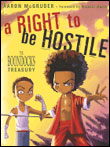(thanks to feministe: The Gazillion Things Crowding Up My Desktop for the link)

Eric Alterman, the whitest Leftist on the planet
The Nation is a well-written, insightful magazine that’s well worth reading. Eric Alterman is one of the best popular media critics today. These are people well worth supporting with your time, money, and attention. Nevertheless, I can’t find an ounce of sympathy for them in my heart–or an ounce of pique at Aaron McGruder–on reading The New Yorker‘s profile of McGruder and its account of a shouting match between McGruder and white liberals at a recent $500-a-plate dinner for The Nation:
On the day of Saddam Hussein’s capture, last December, the left-leaning
political weekly The Nation celebrated its hundred-and-thirty-eighth
birthday. It was a Sunday night, and the weather was dreadful–forbiddingly
cold and wet, heavy snow giving way to sleet–but three hundred people could
not be deterred from dropping five hundred dollars a plate for roast chicken
amid the marble-and-velvet splendor of the Metropolitan Club, on Fifth
Avenue.
. . .
Toward the dessert (chocolate torte) portion of the evening, Uma Thurman
rose to introduce a special guest: Aaron McGruder, the creator of the popular
and subversive comic strip The Boondocks, who, as it happens, had
travelled farther than anyone else to be there, all the way from Los Angeles.
McGruder, one of only a few prominent African-American cartoonists, had
been making waves in all the right ways, poking conspicuous fun at Trent
Lott, the N.R.A.,
the war effort. … It seemed to be, as a Nation contributor said
later, his coronation as our kind of guy.
But what McGruder saw when he looked around at his approving audience was
this: a lot of old, white faces. What followed was not quite a coronation.
McGruder, who rarely prepares notes or speeches for events like this, began
by thanking Thurman, the most ass-kicking woman in America
. Then
he lowered the boom. He was a twenty-nine-year-old black man, he said, who
got invited to such functions all the time, so you could imagine how bored
he was. He proceeded to ramble, at considerable length, and in a tone, as one
listener put it, of militant cynicism
, with a recurring theme: that the
folks in the room (courageous
? Please) were a sorry
lot.
He told the guests that he’d called Condoleezza Rice, the national-security
adviser, a mass murderer to her face; what had they ever done? (The Rice
exchange occurred in 2002, at the N.A.A.C.P.
Image Awards, where McGruder was given the Chairman’s Award; Rice
requested that he write her into his strip.) He recounted a lunch meeting with
Fidel Castro. (He had been invited to Cuba by the California congresswoman
Barbara Lee, who is one of the few politicians McGruder has praised in
The Boondocks.) He said that noble failure was not acceptable. But the last
straw came when he dropped the N-word,
as one amused observer
recalled. He said–bragged, even–that he’d voted for Nader in 2000. At that
point, according to Hamilton Fish, the host of the party, it got
interactive.
Eric Alterman, a columnist for The Nation, was sitting in the back of the
room, next to Joe Wilson, the Ambassador. He shouted out, Thanks for
Bush!
Exactly what happened next is unclear. Alterman recalls that
McGruder responded by grabbing his crotch and saying, Try these
nuts.
Jack Newfield, the longtime Village Voice writer, says that
McGruder simply dared Alterman to remove him from the podium. When
asked about this incident later, McGruder said, I ain’t no punk. I ain’t
gonna let someone shout and not go back at him.
Alterman walked out. I turned to Joe and said, I can’t listen to this
crap anymore,
he remembers. I went out into the Metropolitan
Club lobby–it’s a nice lobby–and I worked on my manuscript.
Newfield joined in the heckling, as did Stephen Cohen, a historian and the
husband of Katrina vanden Heuvel. It was like watching LeRoi Jones try to
Mau-Mau a guilty white liberal in the sixties,
Newfield says. It was
out of a time warp. Who is he to insult people who have been putting their
careers and lives on the line for equal rights since before he was born?
Can you see his face as he says this? The teeth gritted, the lip curled up, the words Ungrateful negro–
just barely stifled between his tongue and his teeth.
Nevertheless, Newfield is right in one respect: the whole fracas reads like a bad flashback from the 1960s. Not, however, for the reasons that Newfield thinks it does: what feels like it came out of a time warp is a bunch of pretentious, comfortable white radicals
(oh, I’m sorry, progressives
— a terminological shift that looks like a bad flashback from the 1910s) lecturing everyone else on how to do enlightened politics, patting themselves on the back, angrily shouting down speakers they disagree with, and snivelling about anyone who says things that make them feel guilty
.
Here, meanwhile, is what McGruder has to say about the whole thing:
At a certain point, I just got the uncomfortable feeling that this was a
bunch of people who were feeling a little too good about themselves,
McGruder said afterward. These are the big, rich white leftists who
are going to carry the fight to George Bush, and the best they can do is blame
Nader?
There’s not much to say on the latter point that I haven’t already said elsewhere in considerably more depth; the main thing to stress here is that, while I have quite a few problems with Green Party strategy since the 2000 election, and a lot of problems with Nader’s campaign for 2004, it’s dreadfully foolish for lefty Democrats to waste their time and effort alienating people who are sympathetic to the independent party movement with slash-and-burn Nader-blaming tactics. The target is Bush: energize your base by taking the fight to him and you will win. Demoralize your base with hectoring and finger-pointing and you will lose, and you will deserve to lose.
It’s the former point that I want to dwell on for a moment: the stifling sense of complacency and self-congratulatory politics that we on the Left are all too often prone to. If there is a characteristic vice of the white, male Left, it is pride: specifically, the phony simulacrum of self-worth that comes from indulgence in a certain sort of Pharisaic purity. The basis of our politics, after all, is the repudiation of some of the very roots of the society we live in — the ugly, daily realities of white supremacy, gay-bashing, war, colonialist occupation, men’s rape and battery against women, and so on. The constant temptation is to act as though we’ve somehow managed to extricate ourselves from the sins of the society that surrounds us, and to purify ourselves through our own virtue.
What happens when that self-image is endangered is all too familiar–all too often we answer criticism with a sort self-righteous, defensive backlash. (This is a lesson that we owe especially to the writings by feminists on the male Left; see, for example, Cocktales, anthologized in Dear Sisters; everything I say here about the white Left just as much to the male Left, the straight Left, the collegiate Left, or whatever form of privileged background you care to look at.) And when this happens, the tactics are all too familiar. We change the subject from what we’re doing to how we’re feeling and what we’ve done–changing the subject from institutional structures and the interpersonal character of our acts, to our own personal good intentions. It shifts from being a question of whether or not I’m doing something fucked up (and if so, what I can do to be accountable for that), to being a question of whether I’m one of Us or one of Them (the bigots, the running-dogs, the misogynists, the Bush Administration–everyone that I, the pure one, have defined myself against). From there it’s not far to taking up criticism as a personal attack rather than as a serious critique; and it becomes very easy just to attack back, to scapegoat the critic and–natch–to reiterate all the virtuous things I’ve done for you (or think I’ve done, anyway), that set me apart from the demoniacal Them–and how dare you not realize it, &c.
But if we want to help build an open and just society, some day or
another we are going to have to answer for all the big and little ways
that we’ve participated in injustice–and the sooner the better for all concerned.
Courage, and pride in accomplishments, is a great thing to have — but without humility and accountability there is no real courage or pride; there is only boldness and egotism. Salvation needs works, but it also needs grace; good intentions alone won’t feed a person who’s hungry or stop an assault or defuse a bomb. I, for one, haven’t always made my good intentions do some good for other people more than once; and I know also that I’m not the only one, either. If pompous white radicals progressives
won’t cop to that on our own, then we could use a good Mau-Mauing every now and again–hell, anything to get us to sit down and shut up and think about what other people are saying for two seconds. It’s not about guilt, and it’s not about radical chic. It’s about having the guts to acknowledge that you’ve fucked up from time to time (and if the elite Left hasn’t been fucking up pretty frequently for the past two decades, what the hell has it been doing?!) and having the humility to listen to people (even if you disagree with half of what they are saying) when they take you to task on it.
Aaron McGruder was right; folks like Eric Alterman and Jack Newfield write some good stuff, but they are feeling way too good about themselves. If McGruder’s shock therapy did not work, then I’m not sure what to suggest, except perhaps a long-term prescrption of Daily Abnegations. Every morning, before they sit down to work, maybe they should repeat to themselves: Black people know more about racism than I do. Women know more about sexism than I do. Poor people know more about poverty than I do. Now let’s work together to do some good by the end of the day.
This may seem like a tall order for someone like Eric Alterman, who describes himself as A contributor to virtually every significant national publication in the US and many in Europe
, but surely the most honest and incisive media critic writing today
can suck it up and manage it.




